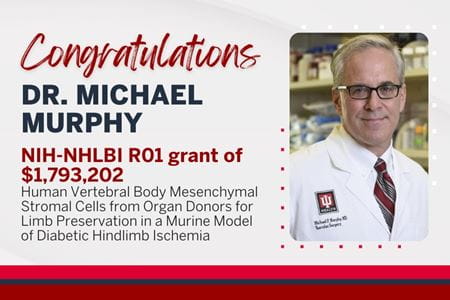We're thrilled to announce the remarkable achievement of Dr. Michael Murphy, who has recently been awarded a substantial NIH-NHLBI R01 grant totaling $1,793,202. This prestigious grant, spanning over four years, is a testament to Dr. Murphy's dedication and expertise in the field. We also extend our appreciation to Dr. Steve Miller for his invaluable contributions to this success.
The focus of this groundbreaking research is on "Human Vertebral Body Mesenchymal Stromal Cells from Organ Donors for Limb Preservation in a Murine Model of Diabetic Hindlimb Ischemia." But what does this mean for the world of medicine?
In simple terms, the study aims to address Critical Limb Threatening Ischemia (CLTI), the severe form of peripheral arterial disease with a staggering annual medical cost of over 10 billion dollars. CLTI poses a significant risk of amputation, especially for diabetic patients, where traditional surgical and pharmacological treatments often fall short. Dr. Murphy's proposal introduces a novel approach involving vertebral bone adherent mesenchymal stromal cells encapsulated in an alginate hydrogel.
This innovative strategy seeks to stimulate vascularization, counteract ischemic muscle damage, and ultimately reduce the incidence of lower limb amputations. By delving into the potential of these mesenchymal stromal cells and understanding the mechanisms behind their ability to promote muscle regeneration, Dr. Murphy's research holds the promise of developing molecular therapies for this major cardiovascular disease.
We applaud Dr. Murphy and his team for their groundbreaking work, as they pave the way for advancements in limb preservation and cardiovascular health.
To learn more about the ongoing publicized research of Dr. Michael Murphy, visit his PubMed.
